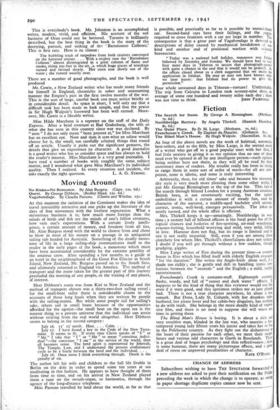Moving Around
AT this moment the isolation of the Continent makes the idea of travel irresistibly attractive and one picks up the literature of the days of free movement with the liveliest expectation. What a mysterious business it is; how much more foreign than the minds of birds and fish are the minds of one's fellow creatures, how vain one's expectations. With a certain lively intelli- gence, a certain amount of money, and freedom from all ties, Mr. Alan Burgess stood with the world to choose from and chose to blow in most of his money on a passage in an antiquated sailing tub headed for Australia. Something of the deadly mono- tony of life in a large sailing-ship communicates itself to the reader in the early pages of the book, a monotony which must have been accentuated considerably by the extreme gentility of the amateur crew. After spending a few months as a guide at an hotel in the neighbourhood of the Great Fox Glacier in South Island, New Zealand, Mr. Burgess passed on to the South Seas, and ultimately returned to England via America. The method of transport and the route taken for the greater part of this journey precluded the meeting of any people, or the visiting of any places, of interest.
Herr Dibbern's route was from Kiel to New Zealand and the method of transport chosen was a thirty-two-foot sailing vessel ; for the small-boat sailor there is considerable charm in the accounts of these long hauls when they are written by people with the sailing-mania. But while some people sail for sailing's sake, others sail in small boats because of the opportunities afforded for the egotist—the small boat on the open sea is the nearest thing to a private universe that the individual can attain without retiring from the real world altogether. Herr Dibbern seems to belong in the second category: July t6. 15° 15' north. Heat. . . . Calm.. . . July 17. I have found a key to the Code of the New Testa- ment. It seems to fit. If every time Christ speaks of " I " or " Me " I take that " I " or " Me " to mean " conscious indivi- dual "—the conscious " I am " at the service of the world, then all becomes sense. The herd spirit is represented by Jehovah, The Temple, Law, and I understand the present evolutionary cycle to be a battle between the herd and the individual. . . . July 18. Once more I think everything through. Death is the penalty of sin.
The author left his wife and children to the full life livable in Berlin on the dole in order to spend some ten years at sea meditating in this fashion. He appears to have thought of them from time to time, and on his arrival in New Zealand played them a tune on the mouth-organ, or harmonica, through the agency of the long-distance telephone.
Miss Parsons travelled by land about the world, as far as that
is possible, and practically as far as is possible by second-hand car. Second-hand cars have their failings, and the papers required to cross frontiers with a car are large in number. The consequence is that a great part of Vagabondage is devoted to descriptions of delay caused by mechanical breakdown of one kind and another and of positional warfare with oriental bureaucrats.
" Today was a national half holiday, tomorrow was Friday followed by Saturday and Sunday. We should have had to Wait four more days in Teheran to secure that photograph-permit with quite a chance in the end that it would not be granted. As the offices closed about us a clerk suggested that we make the application in Isfahan. He may or may not have known what we later learnt: that Isfahan had no power to give this permission."
Four whole unwanted days in Teheran—torture! Unthinkable. The trip from Calcutta to London took seventy-nine days, an average of some one hundred and twenty miles each day ; there


























 Previous page
Previous page